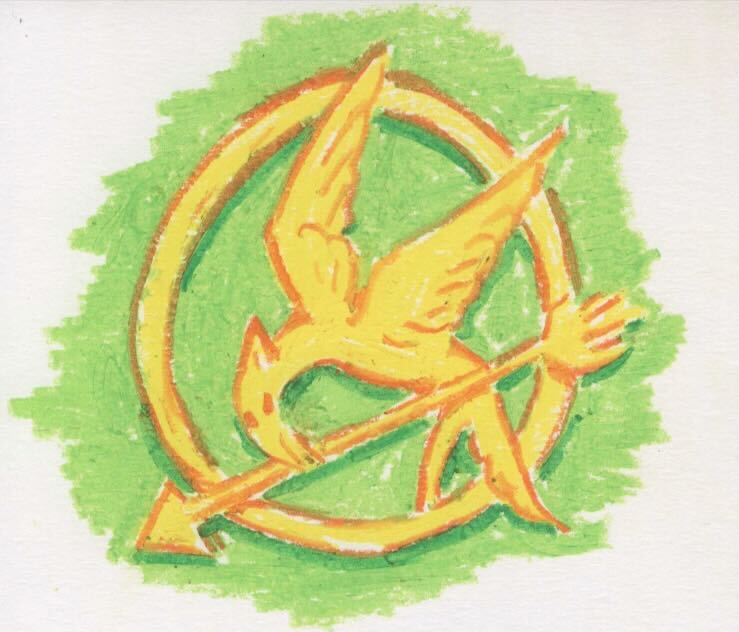Opinion | ‘The Hunger Games’ doesn’t suck
March 30, 2023
I grew up in central Pennsylvania, lodged somewhere along the Appalachian mountains. My childhood was filled with fantastical outdoor adventures — afternoons after school and nights filled with breathing in the deep, earthy scent of the woods all while trampling through the streams that sprung up near our lands and looking up at a full starry sky.
At 11 years old, it was the perfect place to pretend I was living in District 12. My friends and I would trek to the woods in our backyards, equipped with plastic swords, knives and even cheap dollar store hand grenades. We’d make and break alliances, enact really awful fight scenes and record it all on our iPods to watch later.
Over a decade later, I realized I missed the point of “The Hunger Games.” As a kid, I got lost in the thrill of exploring action in a safe environment. After I had my first glimpse of this dystopian novel, I sought after others — including the “Divergent” and the “The Maze Runner” series. Soon “The Hunger Games” became just a blip in my memory. I even dismissed the series as just another dystopian novel. I thought they came at a dime a dozen. And in high school, I swore that I was too good for it.
That all changed when I recently rewatched the series on Netflix. You can make fun of the cringy dialogue, the shaky camerawork and the goofy CGI, but you can’t denounce the story’s message.
“The Hunger Games” is not a narrative about rebelling against the Capitol, at least not in the beginning. What separates Katniss from other dystopian characters is her consistent motive. Every action Katniss makes is to protect the people she cares about. This is what separates “The Hunger Games” from the other dystopian works of the time and why over a decade later, they’ve resurged.
At the Reaping, Katniss becomes the first-ever volunteer from her District to save her 12-year-old sister Prim. In “Catching Fire,” Katniss rebels against the Peacekeeper’s flogging, not because she wanted to provoke Snow, but to protect Gale. She even begs Haymitch to save Peeta from the Quarter Quell games. Everything Katniss does is for the ones she loves, and she’s willing to risk her life again and again for them.
She never wanted a rebellion, and she even hates the role placed on her as Mockingjay. Her only stipulation for acting as a Mockingjay is that President Coin must rescue the other tributes held hostage from the Capitol — Annie, Johanna and Peeta — and that her sister could keep her cat.
Katniss never had a set loyalty to any party. She cares only for her loved ones. Despite the influence and power she has over the people of Panem, she doesn’t seek power — which serves as a social commentary for our current day and age. Often, those who seek power should not have it, and those who are wise understand the implications of wielding it.
“The Hunger Games” also shows the brutality of sacrifice, and who really suffers in war — and it’s never the rich or powerful. The average people, the ones with no control over their situations, are the ones who have historically always suffered most.
As the series progresses in the second and third books, Katniss’ mental state deteriorates. After the first Games, her and Peeta both share nightmares — and rely on each other to get through life. That’s always why “Team Gale” was just a superficial fantasy — Gale didn’t understand Katniss, at least not who she became after the Games changed her. Gale even advocated for making the upper class suffer as the rest of the country did — which read as a slap in the face to Katniss.
Gale completely missed the mark. He lost all empathy in his journey up the ranks of the rebellion. Katniss understood that the price of blood would never pay for the sins of the past. She had enough wisdom to pick and choose her battles. Katniss is the epitome of understanding what we lose when we “win.”
After involuntarily participating in forced murder, violence and loss, Katniss and Peeta both came to that same truth — that no one, not even the privileged, should suffer the same fate and repeat the cycle of violence.
This is where I lost the message as a kid. I was too preoccupied with the “romance” to understand what the novel was truly saying. It was telling us the importance of finding human connection in shared experience and loss, and sometimes no one can understand us except the people who have that same lived experience.
“The Hunger Games” is a story that lasts the test of time — it’s not only a social commentary, but it also warns us of what happens when we become complacent in the system. It demonstrates that our voices have power, and despite all the adversity stacked against us — the odds are always in the favor of justice and truth.
I went from playing The Hunger Games in my backyard to understanding the story on a deeper level once I grew up. Although that same childhood nostalgia might have lost its magic, the stories we loved never truly leave us.
Lynnette Tibbott primarily writes about topics in the sciences and humanities. Write to her at [email protected].









